한국응용과학기술학회 논문 검색
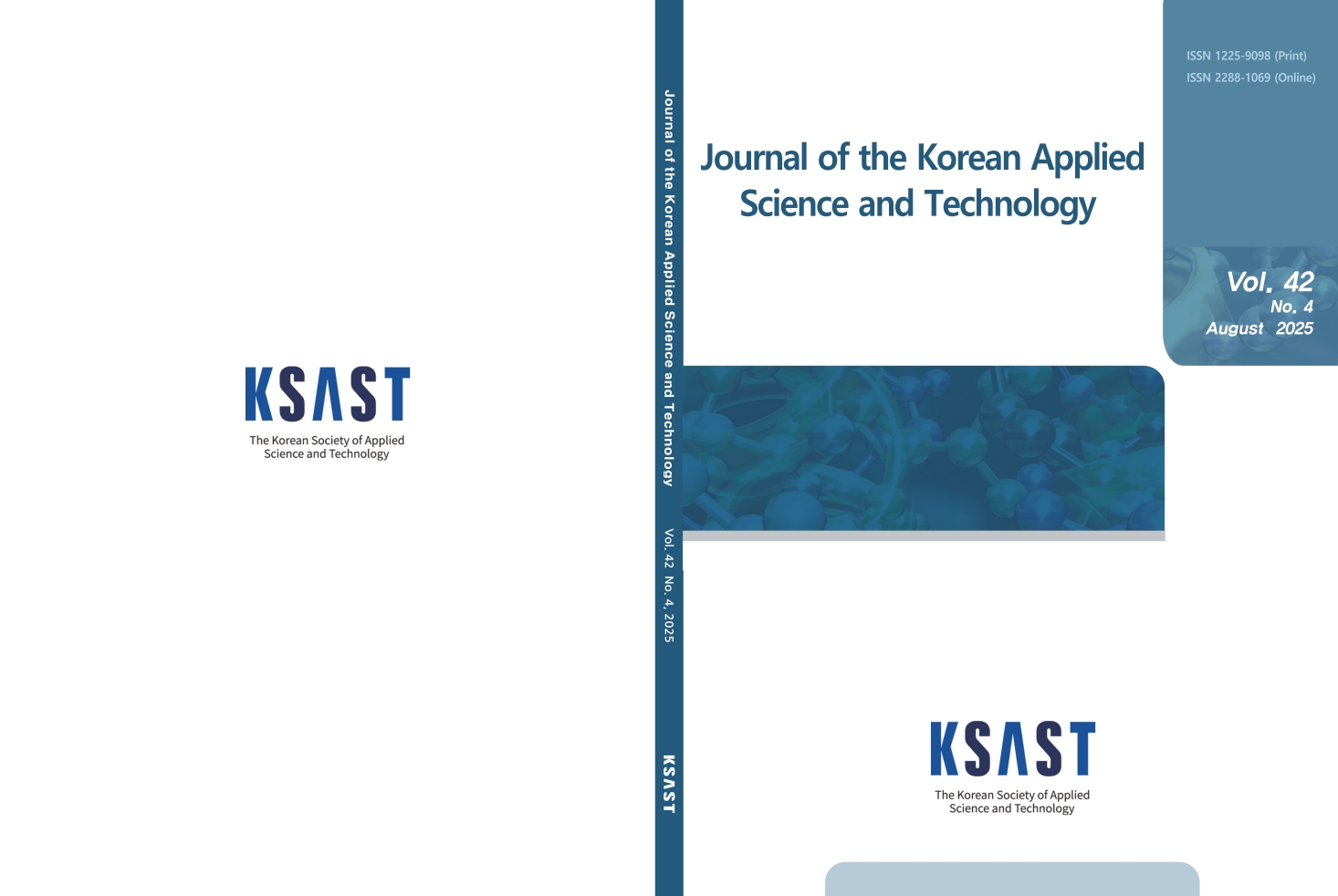
Relationship between Clinical Practice Transition Shock and Professional Self-concept in Nursing Students: The Mediating Effect of Resilience
간행물 정보 : Vol. 42 No. 4, 2025년,
파일형식 : pdf

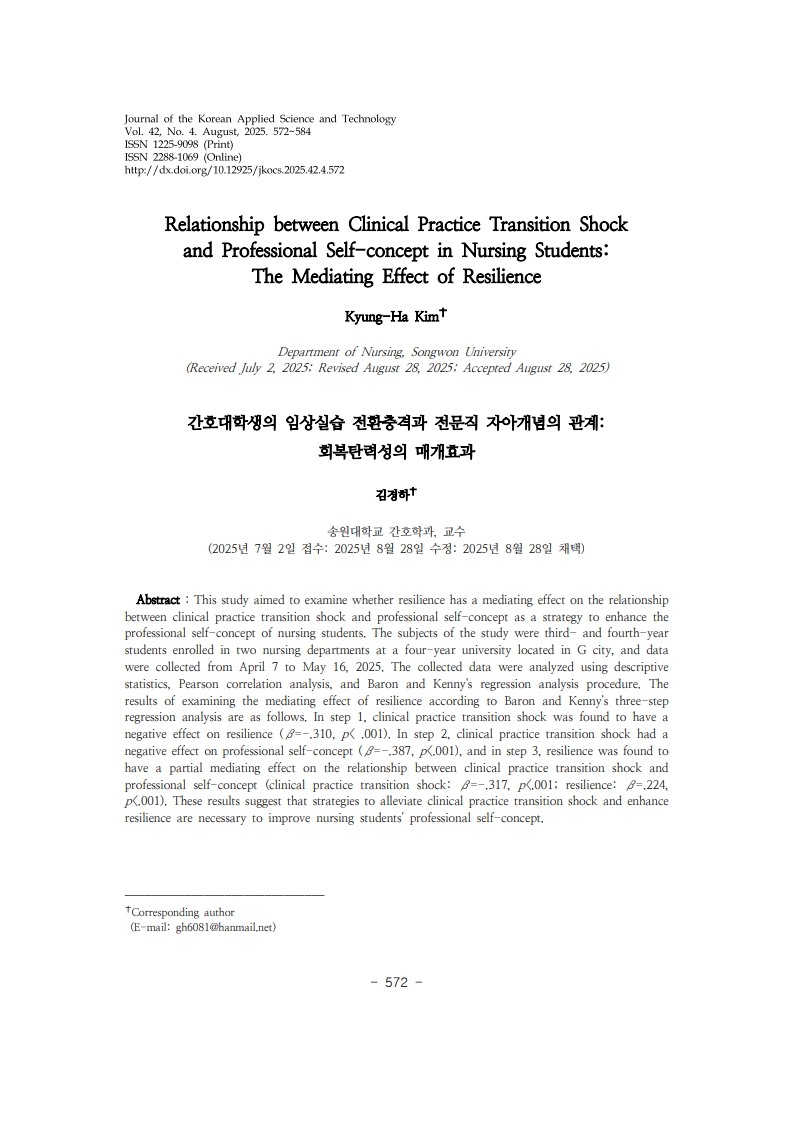
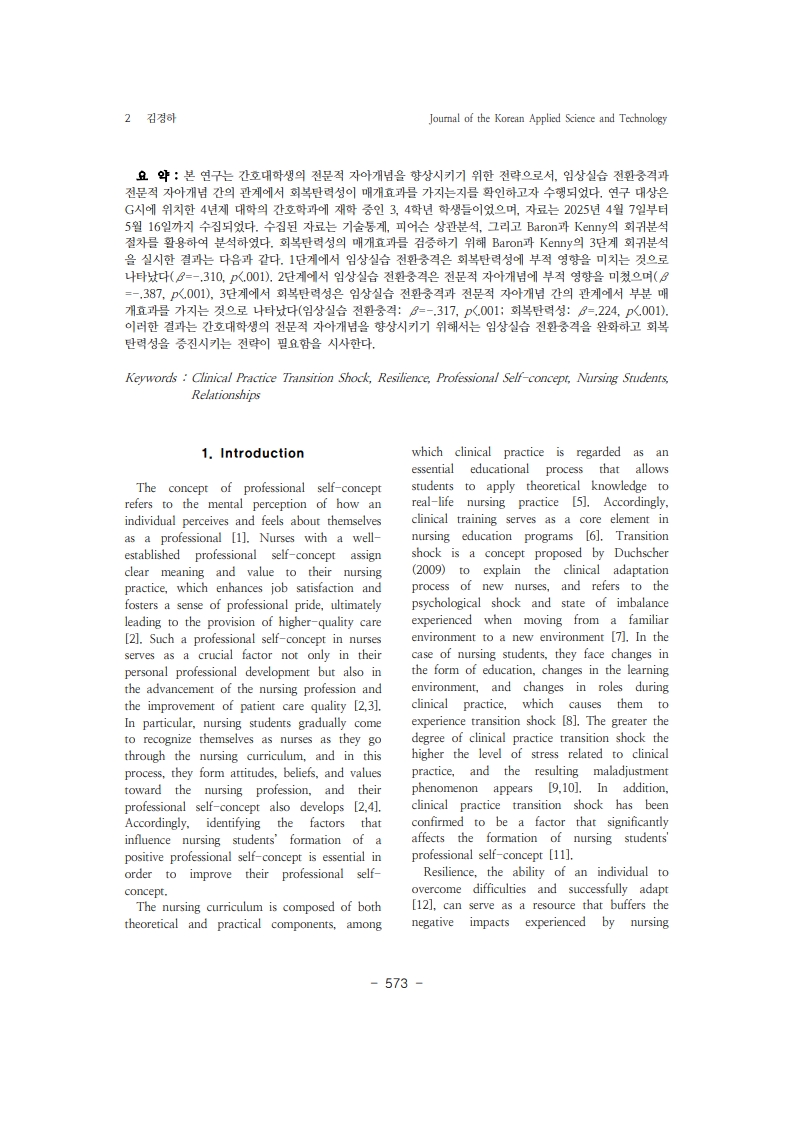
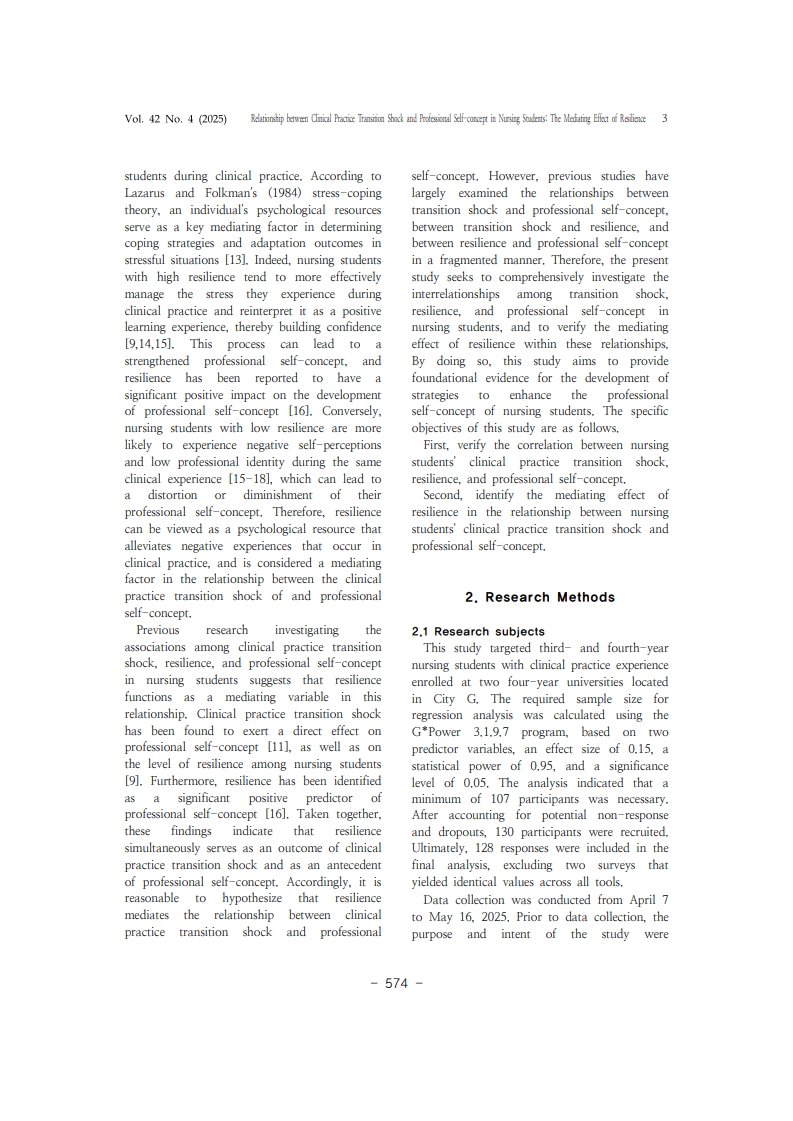
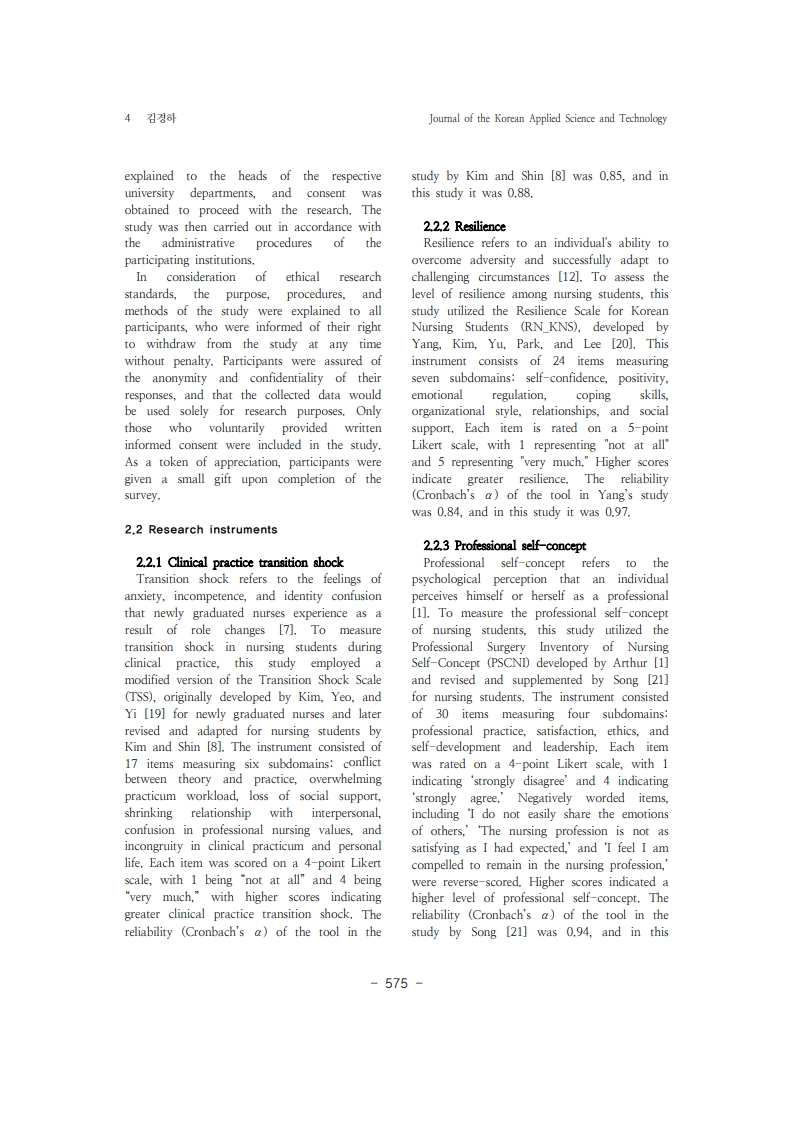
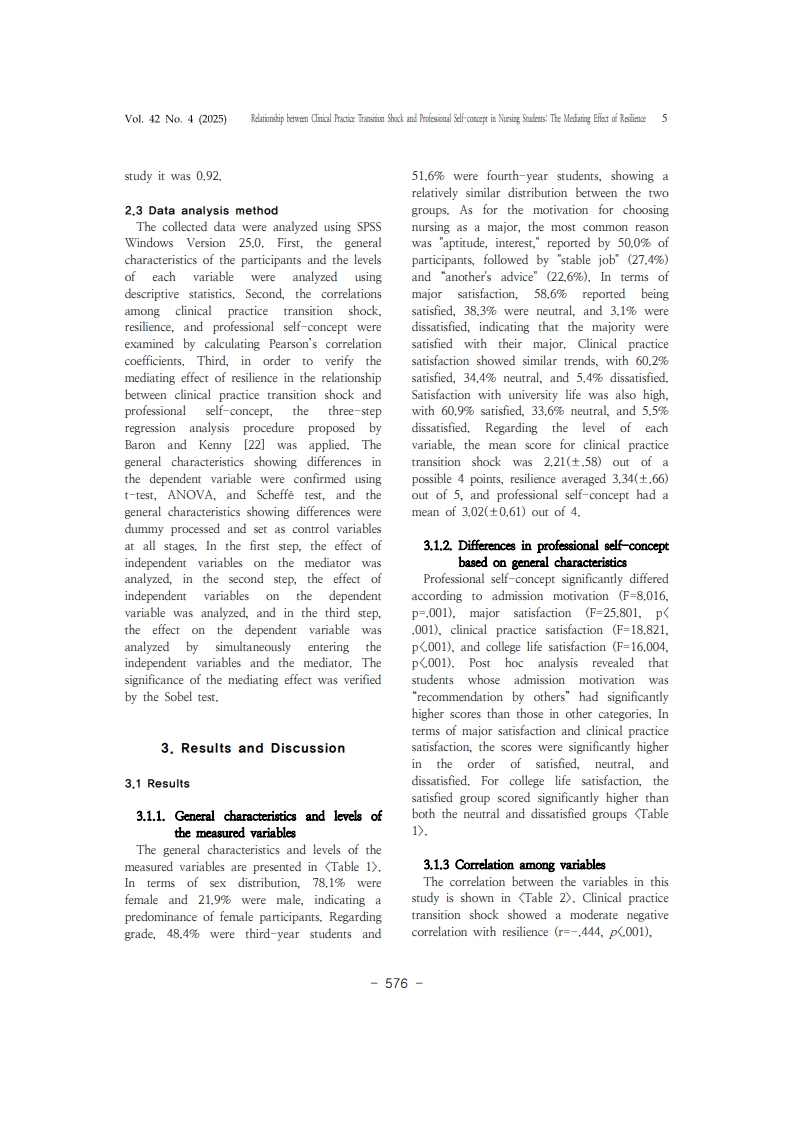
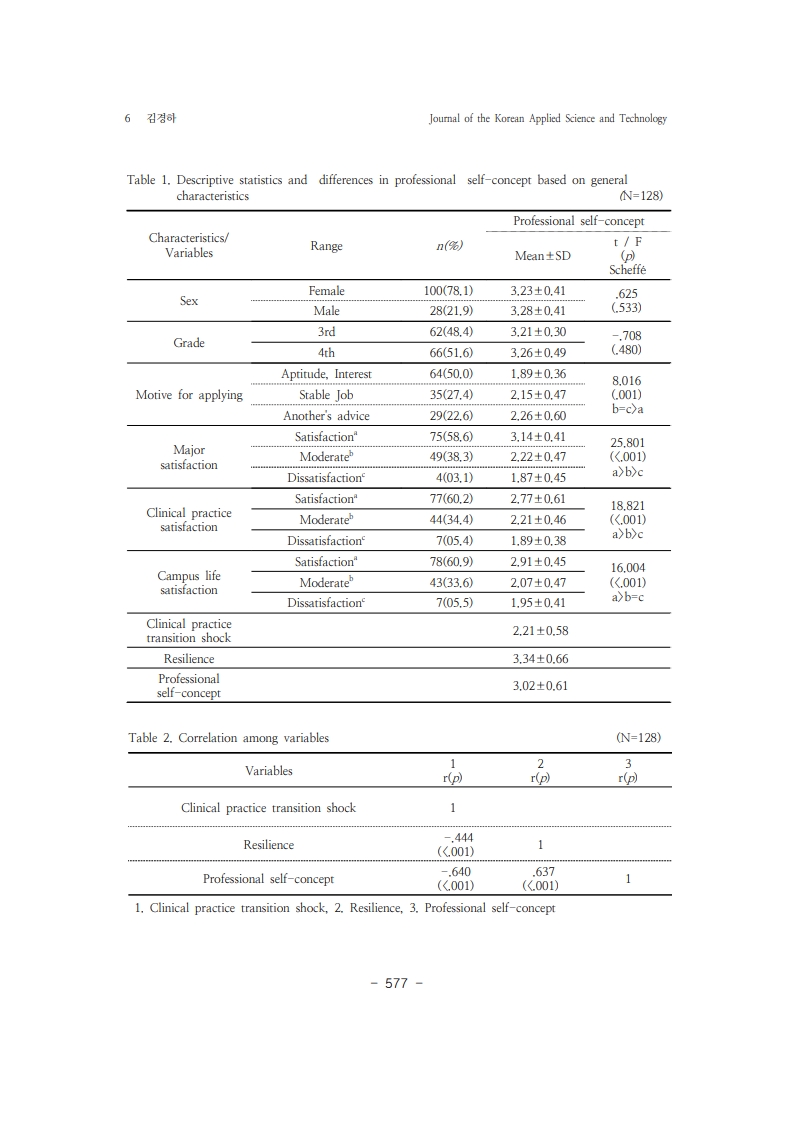
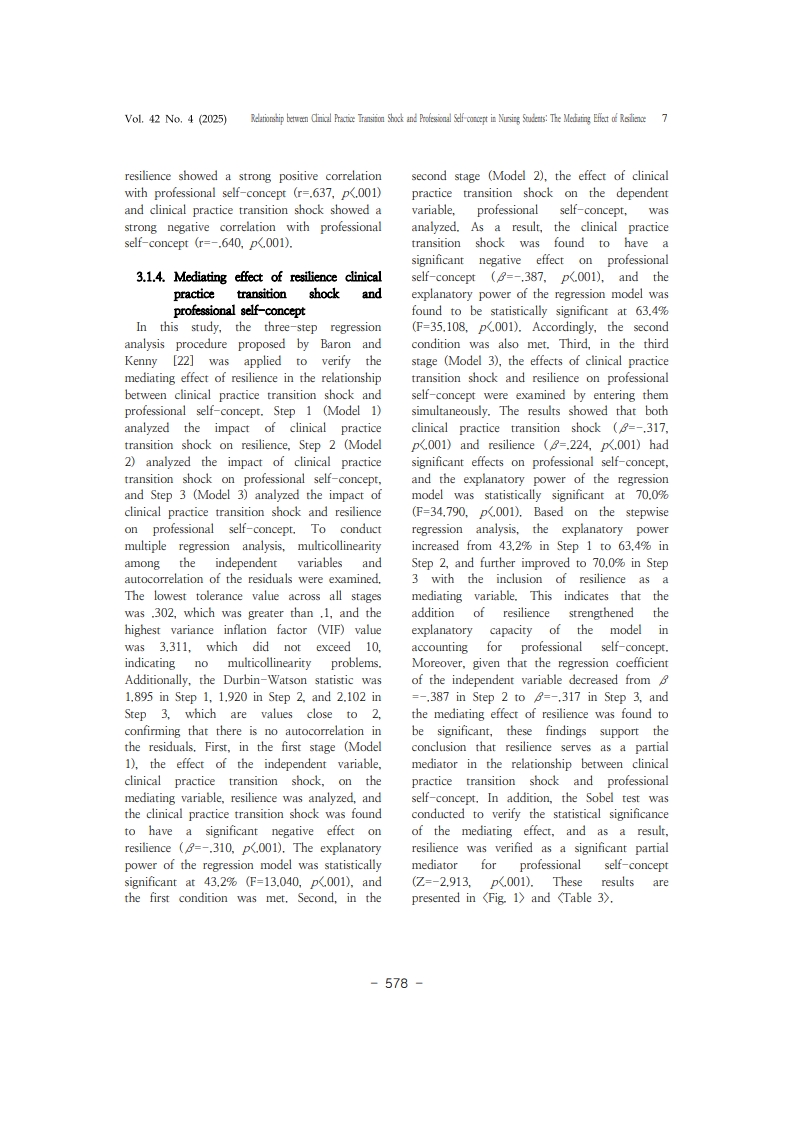
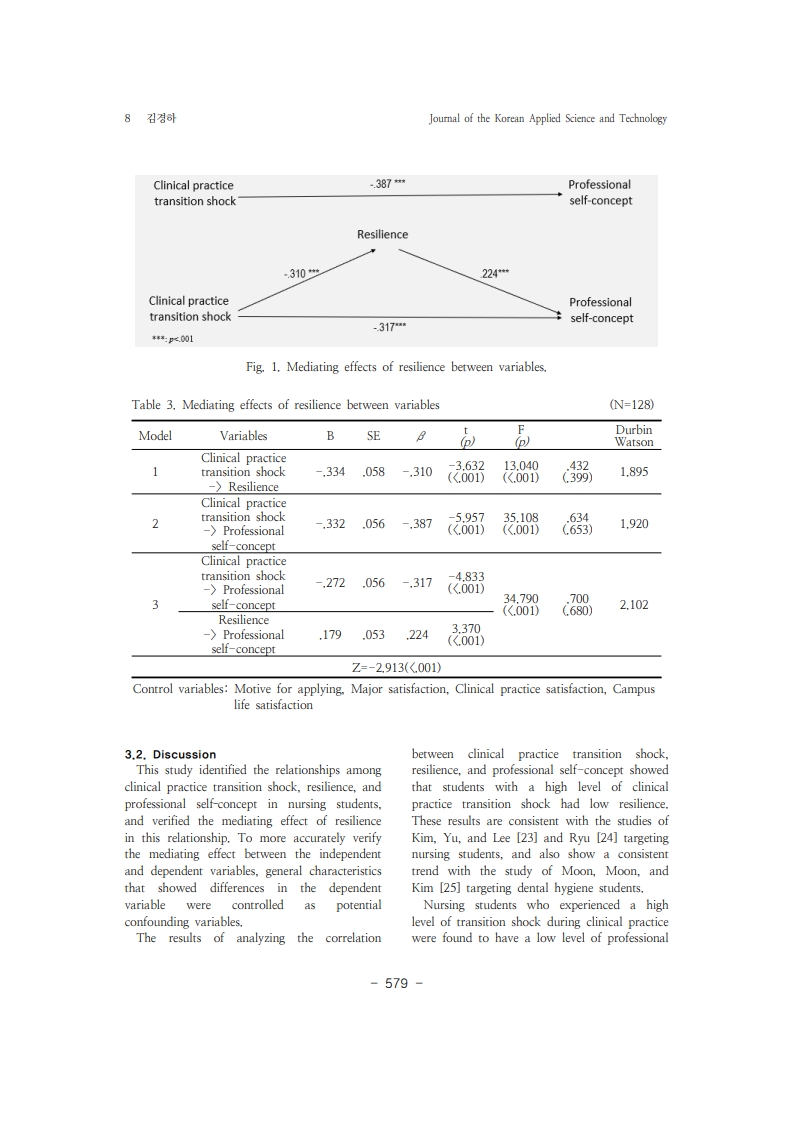
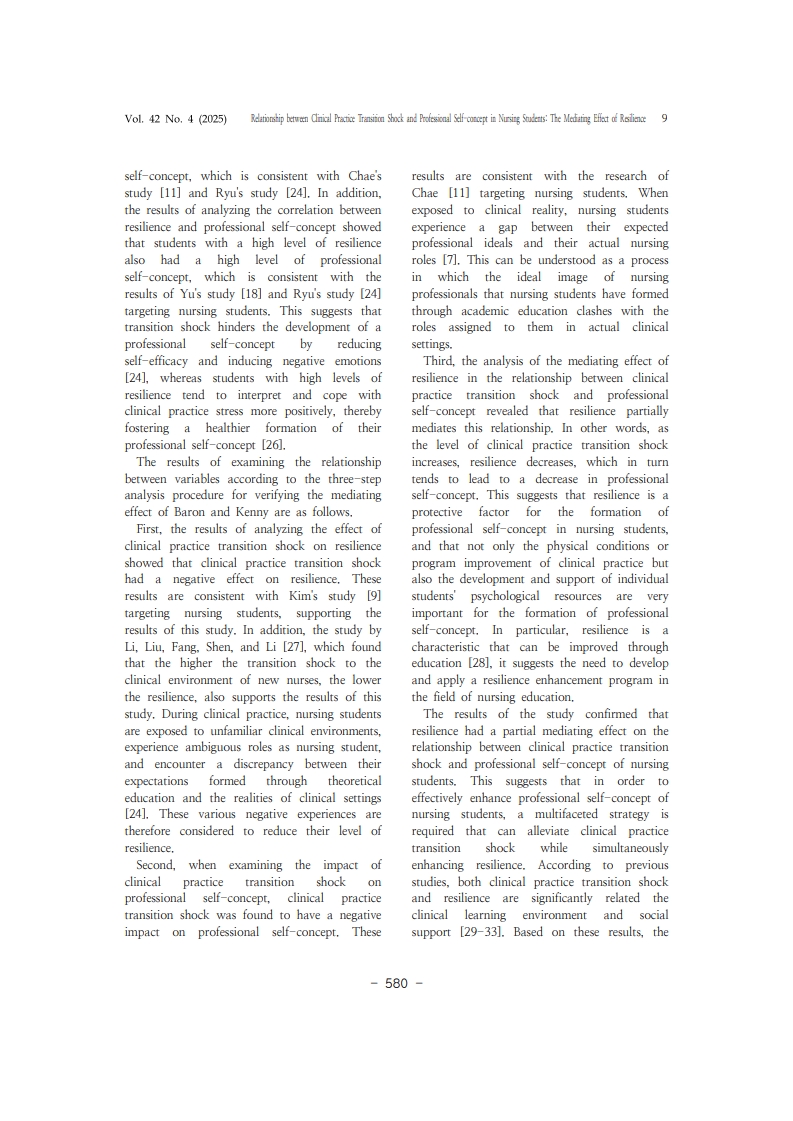
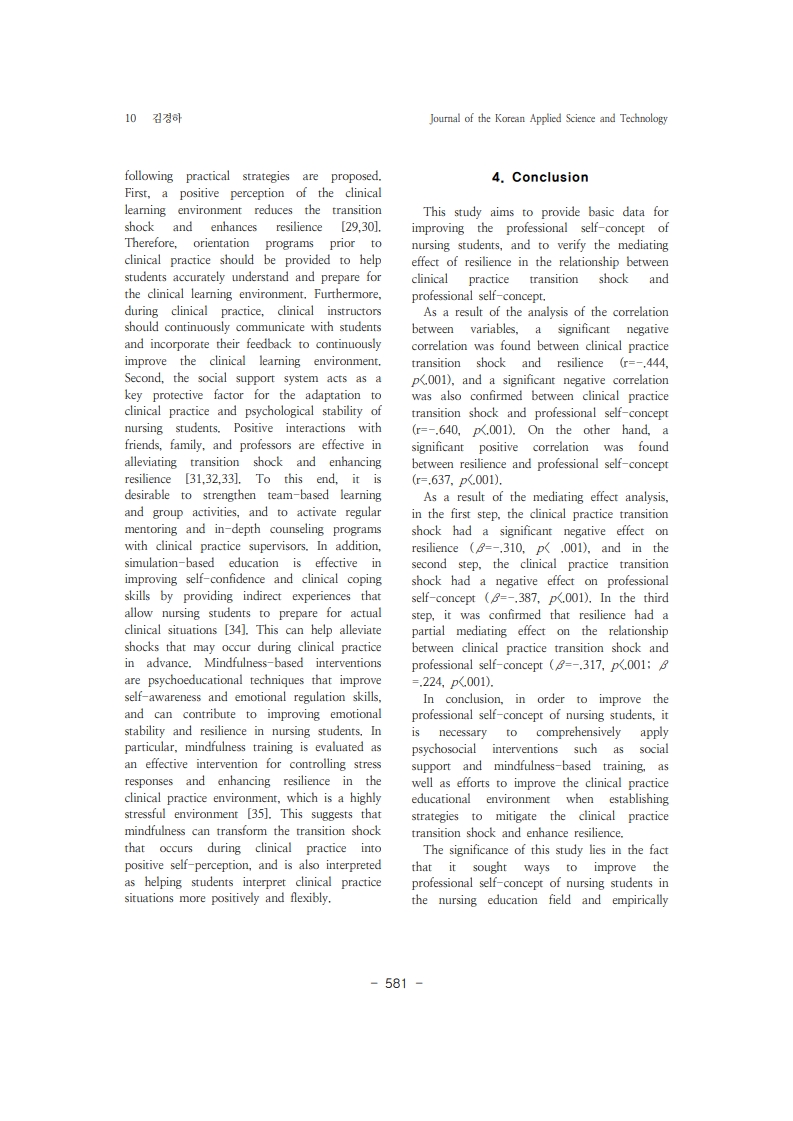
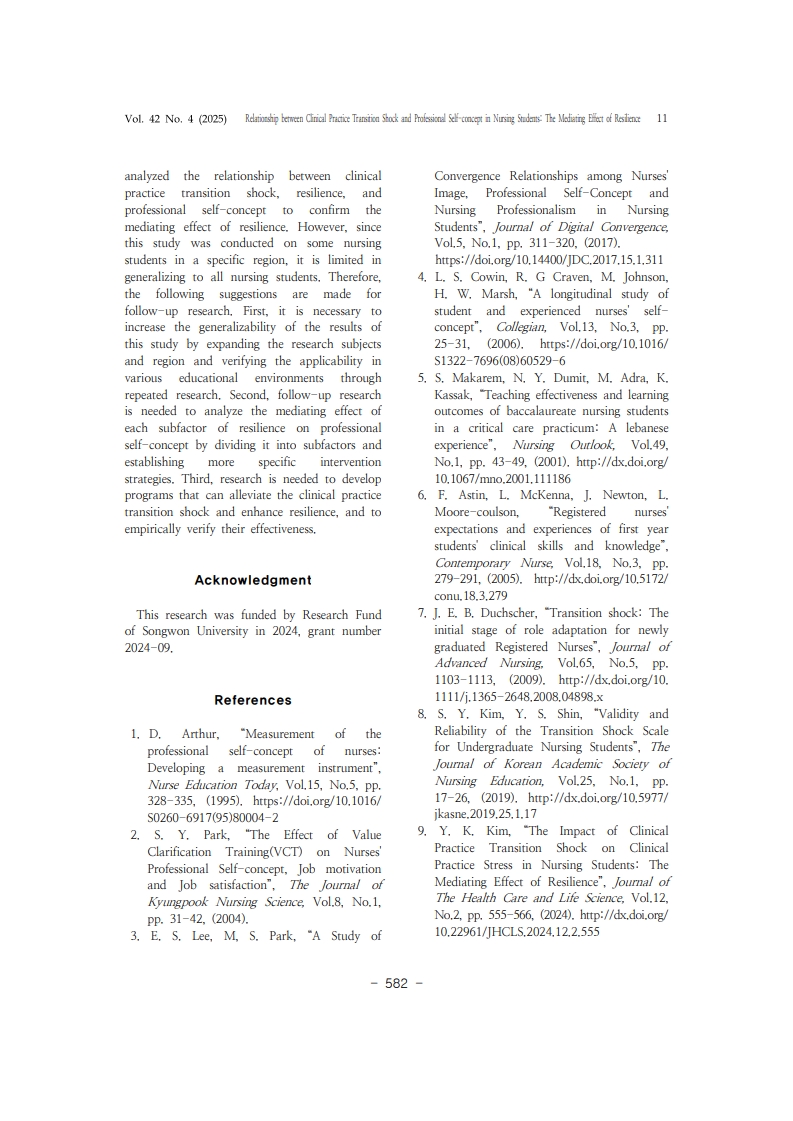
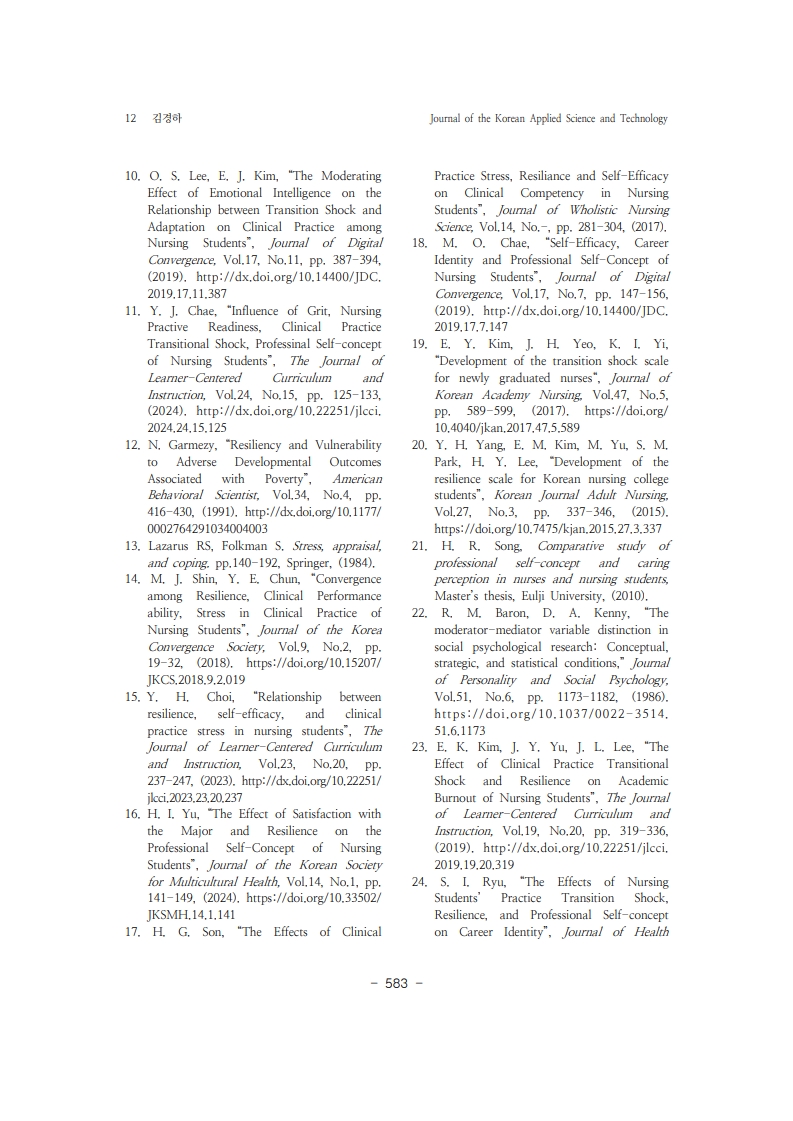
1. D. Arthur, “Measurement of the professional self-concept of nurses:Developing a measurement instrument”, Nurse Education Today, Vol.15, No.5, pp.328-335, (1995).https://doi.org/10.1016/S0260-6917(95)80004-2
2. S. Y. Park, “The Effect of Value Clarification Training(VCT) on Nurses'Professional Self-concept, Job motivation and Job satisfaction”, The Journal of
Kyungpook Nursing Science, Vol.8, No.1, pp. 31-42, (2004).
3. E. S. Lee, M, S. Park, “A Study of Convergence Relationships among Nurses'Image, Professional Self-Concept and Nursing Professionalism in Nursing
Students”, Journal of Digital Convergence, Vol.5, No.1, pp. 311-320, (2017).https://doi.org/10.14400/JDC.2017.15.1.311
4. L. S. Cowin, R. G Craven, M. Johnson, H. W. Marsh, “A longitudinal study ofstudent and experienced nurses' selfconcept”,Collegian, Vol.13, No.3, pp.
25-31, (2006). https://doi.org/10.1016/S1322-7696(08)60529-6
5. S. Makarem, N. Y. Dumit, M. Adra, K. Kassak, “Teaching effectiveness and learningoutcomes of baccalaureate nursing students in a critical care practicum: A lebanese experience”, Nursing Outlook, Vol.49,No.1, pp. 43-49, (2001). http://dx.doi.org/10.1067/mno.2001.111186
6. F. Astin, L. McKenna, J. Newton, L. Moore-coulson, “Registered nurses'expectations and experiences of first year students' clinical skills and knowledge”,
Contemporary Nurse, Vol.18, No.3, pp. 279-291, (2005).http://dx.doi.org/10.5172/conu.18.3.279
7. J. E. B. Duchscher, “Transition shock: The initial stage of role adaptation for newly graduated Registered Nurses”, Journal of Advanced Nursing, Vol.65, No.5, pp. 1103-1113, (2009). http://dx.doi.org/10.1111/j.1365-2648.2008.04898.x
8. S. Y. Kim, Y. S. Shin, “Validity and Reliability of the Transition Shock Scalefor Undergraduate Nursing Students”, The Journal of Korean Academic Society of
Nursing Education, Vol.25, No.1, pp. 17-26, (2019).http://dx.doi.org/10.5977/jkasne.2019.25.1.17
9. Y. K. Kim, “The Impact of Clinical Practice Transition Shock on ClinicalPractice Stress in Nursing Students: The Mediating Effect of Resilience”, Journal of
The Health Care and Life Science, Vol.12, No.2, pp. 555-566, (2024).http://dx.doi.org/10.22961/JHCLS.2024.12.2.555
10.O. S. Lee, E. J. Kim, “The Moderating Effect of Emotional Intelligence on theRelationship between Transition Shock and Adaptation on Clinical Practice among
Nursing Students”, Journal of Digital Convergence, Vol.17, No.11, pp. 387-394,(2019). http://dx.doi.org/10.14400/JDC.2019.17.11.387
11. Y. J. Chae, “Influence of Grit, Nursing Practive Readiness, Clinical PracticeTransitional Shock, Professinal Self-concept of Nursing Students”, The Journal of
Learner-Centered Curriculum and Instruction, Vol.24, No.15, pp. 125-133,(2024). http://dx.doi.org/10.22251/jlcci.2024.24.15.125
12. N. Garmezy, “Resiliency and Vulnerability to Adverse Developmental OutcomesAssociated with Poverty”, American Behavioral Scientist, Vol.34, No.4, pp.
416-430, (1991). http://dx.doi.org/10.1177/0002764291034004003
13. Lazarus RS, Folkman S. Stress, appraisal, and coping. pp.140-192, Springer, (1984).
14. M. J. Shin, Y. E. Chun, “Convergence among Resilience, Clinical Performanceability, Stress in Clinical Practice of Nursing Students”, Journal of the Korea
Convergence Society, Vol.9, No.2, pp. 19-32, (2018).https://doi.org/10.15207/JKCS.2018.9.2.019
15. Y. H. Choi, “Relationship between resilience, self-efficacy, and clinicalpractice stress in nursing students”, The Journal of Learner-Centered Curriculum
and Instruction, Vol.23, No.20, pp. 237-247, (2023).http://dx.doi.org/10.22251/jlcci.2023.23.20.237
16. H. I. Yu, “The Effect of Satisfaction with the Major and Resilience on theProfessional Self-Concept of Nursing Students”, Journal of the Korean Society
for Multicultural Health, Vol.14, No.1, pp. 141-149, (2024).https://doi.org/10.33502/JKSMH.14.1.141
17. H. G. Son, “The Effects of Clinical Practice Stress, Resiliance and Self-Efficacy on Clinical Competency in Nursing Students”, Journal of Wholistic Nursing
Science, Vol.14, No.-, pp. 281-304, (2017).
18. M. O. Chae, “Self-Efficacy, Career Identity and Professional Self-Concept of Nursing Students”, Journal of Digital Convergence, Vol.17, No.7, pp. 147-156,
(2019). http://dx.doi.org/10.14400/JDC.2019.17.7.147
19. E. Y. Kim, J. H. Yeo, K. I. Yi, “Development of the transition shock scalefor newly graduated nurses“, Journal of Korean Academy Nursing, Vol.47, No.5,
pp. 589-599, (2017). https://doi.org/10.4040/jkan.2017.47.5.589
20. Y. H. Yang, E. M. Kim, M. Yu, S. M. Park, H. Y. Lee, “Development of theresilience scale for Korean nursing college students”, Korean Journal Adult Nursing,Vol.27, No.3, pp. 337-346, (2015). https://doi.org/10.7475/kjan.2015.27.3.337
21. H. R. Song, Comparative study of professional self-concept and caringperception in nurses and nursing students,Master’s thesis, Eulji University, (2010).
22. R. M. Baron, D. A. Kenny, “The moderator-mediator variable distinction insocial psychological research: Conceptual, strategic, and statistical conditions,” Journalof Personality and Social Psychology,Vol.51, No.6, pp. 1173-1182, (1986).https://doi.org/10.1037/0022-3514.51.6.1173
23. E. K. Kim, J. Y. Yu, J. L. Lee, “The Effect of Clinical Practice Transitional
